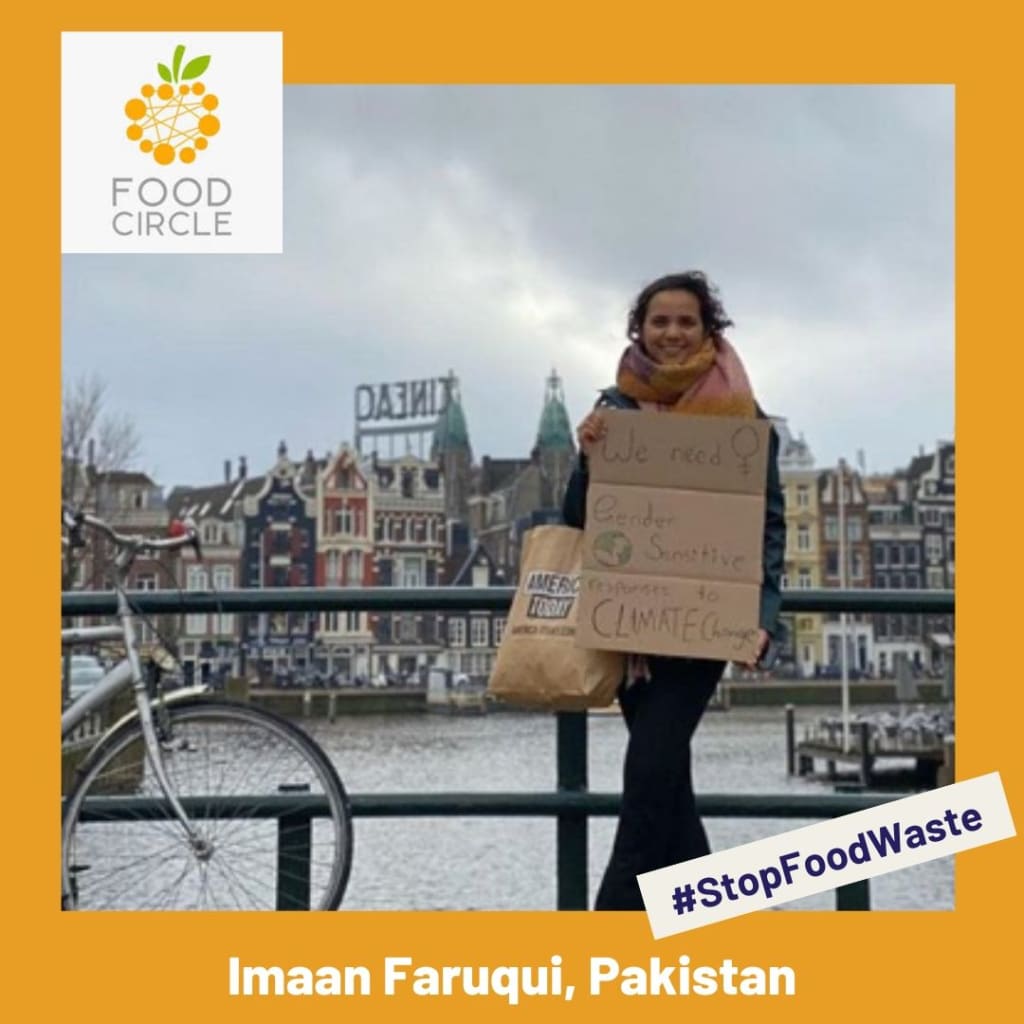Food Waste Around the World - Episode 1: Pakistan
Imaan Faruqui interviewed by Ludovica Viva

Food Waste Around the World is a Food Circle’s project aimed at providing information and raising awareness about food waste. The project is designed as a series of interviews with students coming from different countries with the aim of understanding how this issue is tackled and perceived around the world. This is made possible thanks to Sapient, the mother company of Food Circle, which every year offers internships to students from all around the world creating a unique multicultural environment.
“So there's a lot of poverty and consequently there's a lot of hunger. But even in such a situation, there's a lot of food waste.”
Hi Imaan, welcome to this interview and thank you for participating in the project Food Waste Around the world. To start, can you tell me where are you from and a little bit about yourself?
Sure, my name is Imaan Faruqui, I am Pakistani and I come from a city called Karachi. I've been living in Amsterdam since August. I am currently working as a project coordinator at Food Circle. Since I moved to Amsterdam I've been doing my Master's in environmental geography as well. I've always had a very keen interest in geography. Indeed, I used to teach geography in school for the last three years before I moved to Amsterdam.
Oh, nice! And what is the food waste situation in Pakistan? Is there a lot of food waste?
So, one of the major issues that my country faces is hunger, indeed in the global hunger index Pakistan results are extremely high. So there's a lot of poverty and consequently there's a lot of hunger. But even in such a situation, there's a lot of food waste. However, food waste happens mostly at the production level. Just after the harvest, a lot of food actually gets lost in the transportation, packaging and preserving processes. That's one of the biggest food waste issues in the country. In terms of food waste happening at the consumption level, I would say that the major issue is connected to the culture of weddings. Indeed, weddings in Pakistan are usually very large and with huge buffets full of food of any kind. The problem is that the food is often in great excess and often ends up wasted.
I see, and what about retailers? Are supermarkets or small food retailers a large source of food waste?
In terms of food waste at the retail level, we don't see it as much as for instance in Amsterdam. This is because when food is getting close to its expiring date, it either gets donated or it gets distributed to people in need.
And how much public attention is given to the food waste issue? Do you think it is something that the population is aware or it is something marginal?
There is a lot more attention given towards feeding the people who are hungry, that currently is a priority, over food waste. However, there are some initiatives and some actions undertaken either from the government or local initiatives to redistribute, and so reduce, food waste produced in weddings or commercial events.
So, who would you say is the main driver of awareness and actions aimed at reducing food waste? Is it the government or some more local, community-based organizations?
I would say that is more a bottom-up kind of action. NGOs and small local initiatives which are driving it mostly. One thing that local governments are doing is to force events and weddings to anticipate their celebratory dinners. This is because it is common that during these events the food is served very late, often even after midnight. This makes it extremely difficult then to collect and redistribute leftovers. So now the legislation prevents events from going on after midnight and they are trying to further push this limit to 10 pm. In addition, in this way the food can be served earlier so that participants consume more during the event, reducing the amount that gets wasted. There is also one initiative which is focusing on picking up food surplus, a bit similar to what we've seen in Amsterdam with Too Good To Go. So people pick up food from different restaurants, events and then they redistribute it, mostly to the people in need.
And what about initiatives to reduce food waste at the production level, since you said that is where most food is wasted?
At the production level I haven't heard much because at this scale food is lost mainly due to energy and development issues, which are more difficult to fix. In Pakistan, one thing which is extremely common is that there's not enough electricity for everyone. So, sometimes, energy supplies are distributed in rotation to different communities and locations. This causes fluctuations in electricity that spoil refrigeration and conservation processes. I know that the government is focusing on building dams and they are looking into different energy options because this issue adversely affects communities in many ways.
So the cause of food waste at the production level is improper conservation due to energy fluctuation. What about issues like irrigation and extreme weather?
Yes also that is a problem. Heat waves are very common in the summertime and every year the temperature is getting higher and it's getting worse. This can kill and destroy the crops more and much sooner. So also due to climate change, we are suffering a lot with food loss issues.
You already told me of some actions to reduce food waste from the government and from organizations, any other initiative that comes into your mind?
You actually hear a lot more from NGOs, which are working on this issue. So I can name a couple of NGOs which are working on it. There is one that is called Rizq. I think that it was started by some students in high school that went to collect food waste from different events, or get people to donate them food that then is redistributed to vulnerable communities. Then there is the Robin Hood Army, which is very big because this is an international NGO active in a lot of developing countries as well. They focus on getting food from very large events and donate it to people in need.
Interesting...One last question for you, Imaan. Do you feel that your country is giving enough attention and taking enough action to tackle this food waste issue?
I do feel that food waste is important and the country is aware of the issue, but at the moment it is not high up on their priority list. I think that the first priority in the country is making sure that everyone gets fed.
Yeah I Imagine… even though rescuing food waste means increasing food availability, if you can rescue it in time, of course. So what do you think could be done to shift food waste up in the priority list?
I think that a good step to undertake beneficial to both issues is ensuring that there is a better food distribution. Pakistan is a big country and sometimes the road network is not well developed. This increases the time in which the food is taken from point A to point B, increasing the possibility that the food goes bad before arriving and increasing the vulnerability of communities living along. If there is a proper road system to quickly transport the food and then distribute it efficiently this can reduce the amount of food that gets wasted, feeding people who are very hungry as well.
It sounds good. Okay, that would be it. Thank you very much Imaan.
Okay, Thank you.
Interviewer: Ludovica Viva
Interviewed: Imaan Faruqui
Editor and writer: Ludovica Viva
Organization mentioned in the interview:
Rizq (https://www.facebook.com/Rizq.Sharefood/)
Robin Food Army (https://www.facebook.com/groups/robinhoodarmypakistan/)





Comments
There are no comments for this story
Be the first to respond and start the conversation.